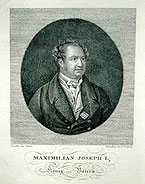Schrift: größer/kleiner
Inhaltsverzeichnis
Sie sind hier: WirRheinländer > english version > The Rhineland under the French (1794 - 1813) > 1806
The Rhineland under the French (1794 - 1813)
1806
The Rhine Confederation
The Rhine Confederation had originated as an amalgamation of medium-sized German states at the instigation of the French Emperor Napoleon I. This confederation of states was dependent upon Napoleon. It served in the break-up of the Holy Roman Empire of German Nations, as well as contributing to the active support of Napoleon's military objectives.
On 12th July, 1806, 16 estates of the German Empire, among them four Electoral Princes, signed the record of the Rhine Confederation – typically enough in Paris. The next step under international law was the withdrawal of the states of the Rhine Confederation from the Association of the Old Empire at the Reichstag (Parliament) of Regensburg on 1st August of the same year.
In itself, this series of events was impossible under the imperial constitution. None the less, the princes revoked all the relevant imperial laws and renounced their titles and honours, insofar as these had had a direct connection to the Kaiser and the Empire. The main conclusion of the imperial deputation was the continued recognition of the Rhine Confederation, which had brought additional lands to many of the later princes within the framework of secularization.

The Rhine Confederation also included Bavaria and Württemberg, as well as the Electoral ArchChancellor of the Empire, Karl Theodor von Dalberg, who was at the same time ruler of Aschaffenburg-Regensburg. The political and territorial influence of the united princes finally led to the end of the old empire. Kaiser Franz II., who had already assumed the title of Emperor of Austria, abdicated as the Holy Roman-German Emperor on 6th August, 1806, and declared the Empire to be dissolved. Thus he was obeying an ultimatum of Napoleon. In the following two years, another 23 German states joined the Rhine Confederation. Only Austria, Prussia, Danish-Holstein and Swedish-Pommern were able to avoid this process.
First and foremost, the Rhine Confederation developed into an offensive and defensive alliance and served to expand and consolidate the French Empire. Should the case arise, the alliance was to raise a common army under the leadership of Napoleon, to which France would provide 200,000 soldiers. Bavaria had to contribute 30,000, Württemberg 12,000, Saxony 20,000 and Westphalia 25,000 soldiers. Their losses soared to unimaginable levels. From the Bavarian contingent in the military campaign against Russia in 1812, only about 3,000 soldiers survived. Moreover, such a high financial burden resulted from Napoleon's wars that finally the German states were almost driven into a state of national bankruptcy. In addition, various states of the Rhine Confederation still had to pay war reparations to France.
As Protector of the states of the Rhine Confederation, the Emperor of France was entitled to take decisions about the alliance and common foreign policy. The continued existence of the German territories was still uncertain despite all of Napoleon's promises. So in 1807 Erfurt, and in 1810 the entire Northwest of Germany was annexed by France. Numerous German princes were elevated in rank and at the same time many smaller territories were annexed. Originally the Rhine Confederation was supposed to be given a constitution and joint state organs, but that was soon doomed to fail because of the individual states' striving for sovereignty. Above all, Bavaria wanted to become an autonomous power.
In 1806 Fürstprimas Dalberg, the First of Princes, who held a position comparable to Imperial Chancellor, summoned a parliament, which never assembled, however. Bavaria and Württemberg refused to send any envoys. Within the states of the Rhine Confederation the princes' striving for sovereignty was expressed in the elimination of the Landstände (provincial representatives), which had hitherto constituted a counterweight to the power of the princes. A further goal of the states of the Rhine Confederation was the reform of existing conditions towards a centrally administered, uniformly governed state. Napoleon created model states with the Grand Duchy of Berg and the Kingdom of Westphalia, and frequently intervened in their administrative structures. The larger the states were, the more reforms were carried out.
Especially those countries which had made large territorial gains were positively forced to reform structures, in order to create a unified state. On the other hand, several smaller territories retained their previous administrative structures, largely unaltered. None the less, equal rights for all citizens were pushed through and the Code Napoleon was introduced as a uniform statute book. Class differences and serfdom were eliminated and freedom of commerce was introduced. Justice and the military were also reorganized according to the French model. By and large, the states of the Rhine Confederation abolished the feudal system. In Bavaria and Baden representative bodies were planned, but in the Kingdom of Westphalia such an assembly was not introduced until 1812.
On 9th December 1813 the powers allied against Napoleon - Austria, Prussia and Russia - in addition to restoring the status quo ante of 1805 for Prussia and Austria, also decided to bring about the dissolution of the Rhine Confederation. On 8th October Bavaria had broken away from the Rhenish association in the treaty of Bad Ried, in favour of the Allies. Recognition of the new Bavarian borders had an effect on the remaining states of the Rhine Confederation. Even during the Battle of the Nations at Leipzig (16th -19th October 1813) auxiliary troops from Württemberg and Saxony deserted to the enemy. The actual dissolution of the Rhenish association began when Napoleon was decisively defeated by military means. Thereby the Rhine Confederation became a mere episode between the dissolution of the old empire and the foundation of the German League on 8th June, 1815.


